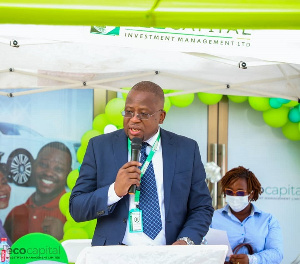- Home - News
- Polls
- Year In Review
- News Archive
- Crime & Punishment
- Politics
- Regional
- Editorial
- Health
- Ghanaians Abroad
- Tabloid
- Africa
- Religion
- Election 2020
- Coronavirus
- Photo Archives
- News Headlines
- Press Release
Press Releases of Tuesday, 31 August 2021
Source: EcoCapital Investment Management Limited
Mutual fund investment : a focus on the ecocapital prime fund
Mutual Fund Investments
Collective investment schemes are investment vehicles that allow investors with similar objectives to pool their funds together with the aim of investing the funds for an objective specified in the scheme particulars also known as the prospectus.
The common interest of the investors demonstrated in the scheme particulars they have signed on is reflective of their risk tolerance level and the expected return from the investment. Mutual Funds and Units Trusts are the two main types of collective investment schemes available to investors in Ghana.
Despite the underlying structural difference in operations, both collective investment schemes are similar in the overall concept of providing a structured investment product, professional management, and approval by the regulatory authorities.
Mutual funds are dominant in the Ghanaian collective investment scheme space with various investment strategies to meet the investment needs of the various shareholders of the fund. With the new directive of retail investors to invest in collective investment schemes, the mutual fund market provides great prospects.
The operations of a mutual fund require the fund to be incorporated as a company with the scheme particulars serving as the regulation to the fund. Like any company, the shareholders appoint the board of directors, and the board contracts the various service providers to work towards effective management of the fund in line with the scheme particulars.
The key service providers appointed are fund managers and custodians licensed by the Securities and Exchange Commission of Ghana. The shareholders appoint the auditors to audit the funds' accounts and report to the shareholders. The investor gains a return on his or her investment if the value of the share held increases.
The price of the share of a mutual fund is ascertained using the Net Asset Value (NAV) of the mutual fund on a daily basis or on such other basis as prescribed in the scheme particulars.
Mutual funds have been available on the Ghanaian investment market for the past two decades with market leaders in the space being Databank EPACK, Databank MFUND, SAS Fortune Fund, SAS Midas Fund among others. In 2019, the EcoCapital Prime Fund was launched as an addition to the mutual fund products available in the Ghanaian Securities Market.
Spotlight: EcoCapital Prime Fund
EcoCapital Prime Fund is an open-ended money market mutual fund with the objective of maximizing current income to the extent consistent with the preservation of capital and maintenance of liquidity to meet short-term needs while enhancing shareholders’ wealth to meet medium to long term financial goals.
The prospectus of the fund allows for investments in Government Treasuries and related debt instruments, Fixed Deposits, Commercial Papers, and other permissible short-term instruments. The fund is managed by EcoCapital Investment Management Limited with Guarantee Trust Bank (Ghana) Limited as the custodian.
During the Initial Public Offer of the Fund in August 2019, the fund raised a total asset of GHS 1.3 million and has grown steadily to GHS 2 million by December 2019 and GHS 5 million by June 2021. The growth in the size of the fund is also translated into the overall improved returns of the fund against its benchmark and other market players.
The fund since inception has returned 38% with an average annual return of 17%. The fund looks to improve its performance given improved return in the 2021 financial year and looks to end the year on a record high given the Year-to-date return as of June 2021 of 16.34%. The fund is an open-ended mutual fund that is available to the general public.
It remains evident that mutual funds provide a secured and well-regulated investment alternative for the investing public. With the presence of board and regulatory oversight, professional advisors, and a well-laid down prospectus to guide investment, investors can be certain of the investment tools being invested in. Investment is key to financial independence and collective investment schemes could be the game-changer.





Entertainment










